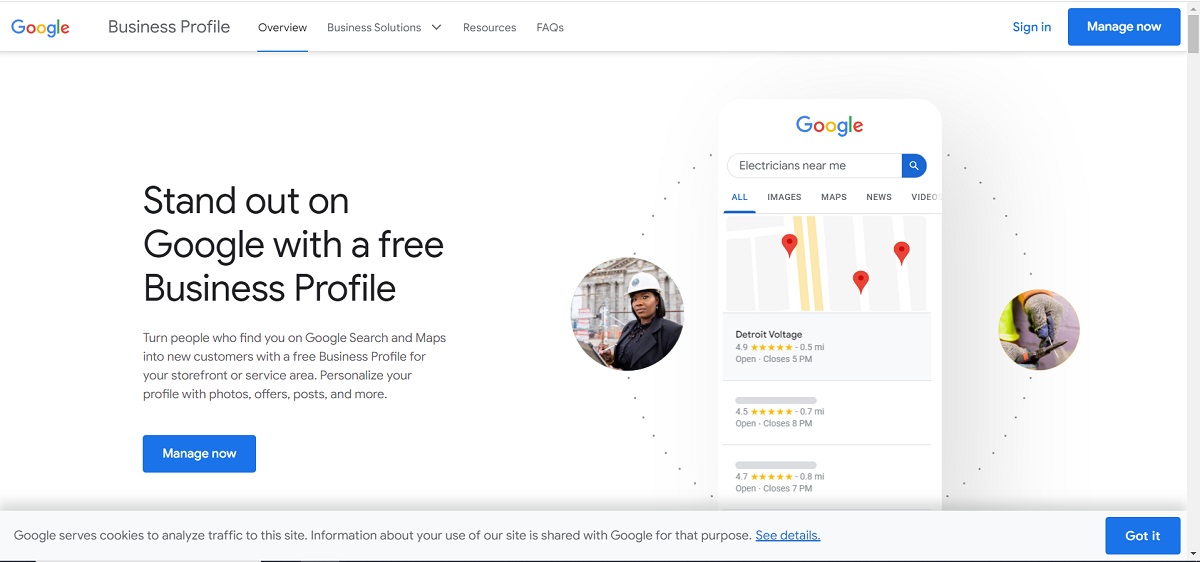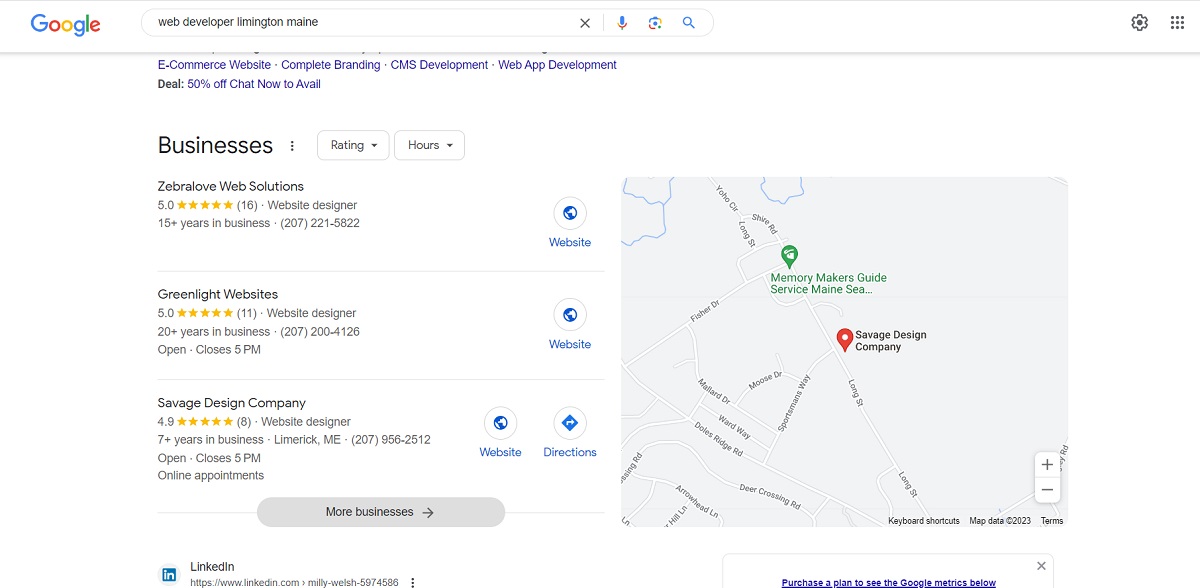If your business provides goods or services to the local population, then it's pretty important that the local community knows you exist and how to find you. How do you accomplish this? By focusing efforts on "local SEO".
If you are new to SEO strategy, please read this blog first.
You can't run a local business - a business with a physical location or serving a geographical area - without a local SEO strategy. Consumers are conducting "near me" searches more than ever. If you skip out on focusing on local SEO as part of your overall SEO strategy, you're going to miss out on the primary avenue consumers use to discover local businesses. To discovering YOUR business.
Local SEO helps Google and other search engines rank your business listing and your local organic search results. When you give Google more information for your Google Business Profile (formerly Google My Business) listing, you can appear more often for related search queries. You will also rank higher on the Google Map Pack, the mapped business list that comes up when you search for local products and services. Listing your business on Google is free and will definitely help people find you through Google searches and on Maps which will likely turn searchers into customers.

Source: GO-Gulf Studies
When you concentrate on building local SEO, your only competitors become other businesses operating in the same geographic area as you. It's an excellent way to avoid the nearly impossible feat of trying to claim a top search engine ranking in the national arena.
Another benefit of local SEO is it drives potential customers to your website. This will dramatically improve your conversion rate. Since such a staggering number of consumers make a purchase following their search, there is no denying that local SEO results in better conversion rate. Increased traffic results in increased sales.
Local SEO helps build local business. It combines your keywords with your local area results ("landscapers near me", "Portland Maine wedding venue"). Search engines pull up the most relevant websites that are nearby.
When people search without specifying a geographic area, if there is a business of that type locally, the search engine will pull up geographically close businesses to try to help narrow your search ("website developers", "college application tutors").

As mentioned above, Google My Business is the most important thing you can do for local search! It helps with your local SEO, and also if someone is using Google Maps to find a business. Google Business Listing results will come up in a search before natural results.
Fill out your Business Listing completely! Put your keywords in your business description, and fill in services/products area fully and with keywords.
Use Google Maps and embed a map on your website (usually on your contact page or a page with directions to your location if open to the public).
Bing Places (Bing version of Google Business Listings) is also a good thing to fill out. You can import your GBL information into this option.
Many local directories will add you without you doing anything. Make sure your NAP is consistent on the internet! Google yourself and your business to see what comes up and where it comes up, is all that information correct?
Search "my town" web directory to find others ("Limington, Maine web directory"). Edit as necessary if you can, add yourself if you're not there.
If you want to get into a number of web directories all at once, a service like YEXT is a great solution. YEXT includes all the major business directories, such as City Search, Yellow Pages, MerchantCircle, and more. YEXT does have a cost, but if your local market is essential to your business it is a great tool to make sure your listing is consistent throughout the internet. Zebralove Web Solutions offers YEXT listing as part of some of our SEO services and Marketing Packages.
A linking strategy is when you purposely seek out quality links going into (or out of your website). Join your local chamber or other local networking groups and make sure there is a link from their website to yours with your location, contact and description completely filled out.
Find local people who you are in the same industry as, but are not competitors with, and do a link exchange. Many websites have "local resources" pages and that can be a great place to do link exchanges with other local businesses that may be of interest to your visitors. If you refer back and forth with other businesses or businesses that sell your services, ask them to list you on the website with a link to yours (and do the same for them).
Create incoming links to your website with guest blogging. Write informative articles that show you are an expert in your field and ask to post them on another website's blog page.
Remember that internal links in your website also matter, so write blogs for your own website as well, and link relevant keywords to the pages where they are well represented on your website. The better your content, the more likely people will link to it naturally without you having to ask.
Ask happy customers for Google Reviews (these impact SEO the most).
The key to getting customers to write reviews? Ask! Also, make it easy for them. Give instructions to help get reviews, share a link to give you a Google, Yelp, Facebook and other review sites you participate in. If a customer praises you verbally ask them if they would put that in an online review for you.
Get Yelp reviews. It can be work to get them not be filtered out by Yelp, ask people who have readily used Yelp to give you a review. Align yourself with other Yelp reviewers, start a fellow businessowners group and do reviews for one another.
Note that the length of reviews matters! It helps for reviews to be lengthy and thorough to rank. They need to be detailed!
If you really want to be a local resource, you need to be involved in your local community and be visible. Sponsor events, contribute to local charities, show up at community activities, participate in local business groups.
Add a blog category and/or Resources page to your site about things going on in the area (what's happening, cover events, lists of local resources).
The more quality content you have that helps people with local resources, the better you will look. Get creative!
One of the best ways to promote your website is to utilize social media platforms such as Facebook, LinkedIn, Instagram, Twitter, and Pinterest. You need to use the best social platforms for your business - figure out what your audience is using and paying attention to.
Pick two social media channels that you are comfortable with to post to consistently (more is usually overwhelming). It's best to choose ones your audience is on, but you also need a level of comfort so that you will be successful.
If you are strictly a local business (venue, massage therapist, contractor working only in your local area), then you really want to build your business' local SEO.
If you are partially local (web developer, performer, consultant, product-retailer), then local SEO should only be part of your overall SEO strategy.

Noelle has been a marketing professional, and a published author and copywriter for over 20 years. Her work has been featured in both print publications and online media, where she has written on a broad range of topics. She owns Castle Media Co., assisting businesses with their marketing and digital media needs, specializing in website development, content marketing, social media, copywriting, and blogging.
Contact Author